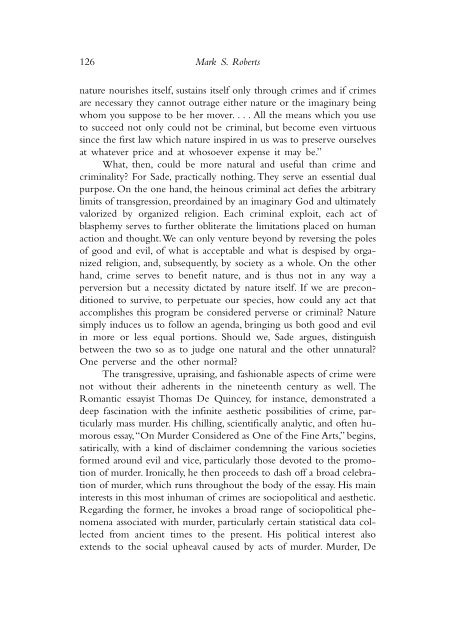Create successful ePaper yourself
Turn your PDF publications into a flip-book with our unique Google optimized e-Paper software.
126 Mark S. Roberts<br />
nature nourishes itself, sustains itself only through crimes and if crimes<br />
are necessary <strong>the</strong>y cannot outrage ei<strong>the</strong>r nature or <strong>the</strong> imaginary being<br />
whom you suppose to be her mover. . . . All <strong>the</strong> means which you use<br />
to succeed not only could not be criminal, but become even virtuous<br />
since <strong>the</strong> first law which nature inspired in us was to preserve ourselves<br />
at whatever price and at whosoever expense it may be.”<br />
What, <strong>the</strong>n, could be more natural and useful than crime and<br />
criminality? For Sade, practically nothing. They serve an essential dual<br />
purpose. On <strong>the</strong> one hand, <strong>the</strong> heinous criminal act defies <strong>the</strong> arbitrary<br />
limits <strong>of</strong> transgression, preordained by an imaginary God and ultimately<br />
valorized by organized religion. Each criminal exploit, each act <strong>of</strong><br />
blasphemy serves to fur<strong>the</strong>r obliterate <strong>the</strong> limitations placed on human<br />
action and thought. We can only venture beyond by reversing <strong>the</strong> poles<br />
<strong>of</strong> good and evil, <strong>of</strong> what is acceptable and what is despised by organized<br />
religion, and, subsequently, by society as a whole. On <strong>the</strong> o<strong>the</strong>r<br />
hand, crime serves to benefit nature, and is thus not in any way a<br />
perversion but a necessity dictated by nature itself. If we are preconditioned<br />
to survive, to perpetuate our species, how could any act that<br />
accomplishes this program be considered perverse or criminal? Nature<br />
simply induces us to follow an agenda, bringing us both good and evil<br />
in more or less equal portions. Should we, Sade argues, distinguish<br />
between <strong>the</strong> two so as to judge one natural and <strong>the</strong> o<strong>the</strong>r unnatural?<br />
One perverse and <strong>the</strong> o<strong>the</strong>r normal?<br />
The transgressive, upraising, and fashionable aspects <strong>of</strong> crime were<br />
not without <strong>the</strong>ir adherents in <strong>the</strong> nineteenth century as well. The<br />
Romantic essayist Thomas De Quincey, for instance, demonstrated a<br />
deep fascination with <strong>the</strong> infinite aes<strong>the</strong>tic possibilities <strong>of</strong> crime, particularly<br />
mass murder. His chilling, scientifically analytic, and <strong>of</strong>ten humorous<br />
essay, “On Murder Considered as One <strong>of</strong> <strong>the</strong> Fine Arts,” begins,<br />
satirically, with a kind <strong>of</strong> disclaimer condemning <strong>the</strong> various societies<br />
formed around evil and vice, particularly those devoted to <strong>the</strong> promotion<br />
<strong>of</strong> murder. Ironically, he <strong>the</strong>n proceeds to dash <strong>of</strong>f a broad celebration<br />
<strong>of</strong> murder, which runs throughout <strong>the</strong> body <strong>of</strong> <strong>the</strong> essay. His main<br />
interests in this most inhuman <strong>of</strong> crimes are sociopolitical and aes<strong>the</strong>tic.<br />
Regarding <strong>the</strong> former, he invokes a broad range <strong>of</strong> sociopolitical phenomena<br />
associated with murder, particularly certain statistical data collected<br />
from ancient times to <strong>the</strong> present. His political interest also<br />
extends to <strong>the</strong> social upheaval caused by acts <strong>of</strong> murder. Murder, De
















